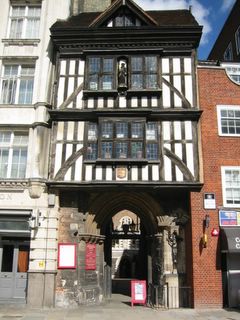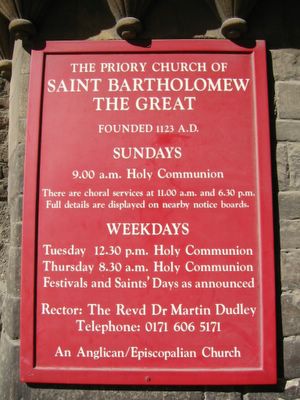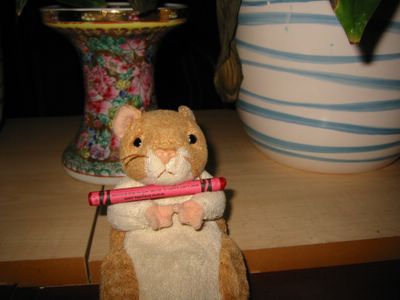There was a conspicuous dearth of English literature in my education. In high school, we were taught the basics and rigors of the structure and grammar but on the literary side almost all the short stories, plays, and poems we discussed were third-world centric. Works by noted Filipino writers like Nick Joaquin or other Asian or African authors (all of which I can't remember now) were what we read and discussed. Nothing wrong with that in fact I got to appreciate that English writing talents also exists in these non-English-native-speaking countries. My college English lessons, on the other hand, were all single-mindedly directed towards technical writing. No flowery words or langous description, everything is precise, measured and concise. That definitely killed the writer in me that was budding in my first year in high school.
In the light of this, I've always longed for knowing all these English classics that are often quoted, referred to, or alluded to by a lot of writers that I planned on reading them one by one 'til I keel over from old age. This spurred my initial headway in collecting classics like Jane Austens novels. I tried reading some Shakespeare but the olde English gave me a headache! Most of the time I couldn't make heads or tails of what he's trying to say. If I constantly refer to annotations it inevitably banishes the fluid poetry of the magic of words. Half of the greatness of works of art is in the appreciation of people. If I can't understand what the writer wants to say it's a cinch I wouldn't enjoy it and what good is a piece of writing if nobody can understand or relish it.
I picked up my first Jane Austen when I was about 15, when a cousin pressed a copy of Pride and Prejudice in my young hands. At first I found the Victorian language tedious but as I got used to it I excitedly reveled in the mellifluous witty funny prose of Miss Austen. After several decades, it's only now that I picked up another Jane Austen - her first novel Sense and Sensibility.
What struck me in that novel was how everyone wass obsessed with money or how much money someone has. Although arguably, the Dashwood sisters put a higher premium on love, honor, and integrity. But still at the back of their romatic minds they cleverly calculate if their inamorata has enough money to allow them to live decently. I can't blame them since at that time (mid-1700s) middle to upper class women are not allowed to work. It is virtually a social suicide if they as much as expend any energy in earning money. So all their lives (in my opinion) were spent in idle talk and gossip and frivolous things besides the management of the household which I think was the only practical thing they do and even with that they have servants to do everything for them. I don't know, I think I'll be bored to death if I were living as a woman in England during that time.
select * from thoughts_array where it_contains = 'diary' or consists_of = 'travel';
About Me
Friends & Favs
- My Food Blog
- Ajay's Writings On The Wall
- AMoores
- April Journeys
- Baby Rambutan
- Beautiful Mind
- the Best Thing In Life Is Free
- Buddha Dharma
- Crystalinks
- Dagboek van Thesserie
- Deja Brew
- Euphonies In My Solitude
- Kwentong Tambay
- Manilena
- Mec As Mom
- Mecomposing
- MissT-The DutcheD Pinay
- My Hideaway
- Now What, Cat?
- Our Kitchen
- Pansitan ni Ate Sienna
- Parallel Universes
- Pinay Expat
- Sassy Lawyer
- Serendipity
- Tagay Mo Pre!
- Turo ni Tito
- The Walk Of Ten Thousand Steps
- Wifely Steps
- Writings On The Wall
Contact
Labels
celebrations
computers
concerts
education
everyday life
family life
festivals
friends
gifts
health
humour
literature
Litratong Pinoy
movies
music
musings
news
pets
photography
rants
raves
relatives
reminiscing
science
sports
techie
theatres
Travel - Europe
Travel - London
Travel - Philippines
Travel - Switzerland
Travel - UK
TV shows
work
Friday, October 28, 2005
Wednesday, October 19, 2005
Smithfield Market
 We had a chance one Saturday afternoon to visit Smithfield Market near the financial centre of London. I totally forgot that they are open only very early in the morning and close at around 9AM. So by the time we were there the market itself was closed and we just walked around the vicinity to see some interesting spots.
We had a chance one Saturday afternoon to visit Smithfield Market near the financial centre of London. I totally forgot that they are open only very early in the morning and close at around 9AM. So by the time we were there the market itself was closed and we just walked around the vicinity to see some interesting spots.Smithfield Market, a meat and livestock market, has been in existence as far back as 14th century over a large open space just outside the walls of the old City of London. The current building where it is housed was completed in 1868. Good thing they managed to preserve this beautiful Victorian structure.
 Besides the market, it also has a gruesome history being a place of public executions for people convicted of heresy, treason, murder, etc. Nearby we saw a big plaque for Scotsman William Wallace more popularly known as Braveheart. His marker was festooned with fresh flowers, candles, and Scottish flags.
Besides the market, it also has a gruesome history being a place of public executions for people convicted of heresy, treason, murder, etc. Nearby we saw a big plaque for Scotsman William Wallace more popularly known as Braveheart. His marker was festooned with fresh flowers, candles, and Scottish flags. Also in the vicinity is the old church of St. Bartholomew established as a monastery in the 12th century. The abbotts built a hospital as well of the same name which is now popularly known as St.Bart's hospital. Though the monastery was dissolved in Henry VIII's dissolution of all Catholic churches in the mid 16th century, it survives today as a quaint old church no doubt because it transformed itself into an Anglican church.
Also in the vicinity is the old church of St. Bartholomew established as a monastery in the 12th century. The abbotts built a hospital as well of the same name which is now popularly known as St.Bart's hospital. Though the monastery was dissolved in Henry VIII's dissolution of all Catholic churches in the mid 16th century, it survives today as a quaint old church no doubt because it transformed itself into an Anglican church.

Tuesday, October 04, 2005
Bebot's Monkey Business
My eldest daughter goes every Saturday for her dance lessons in central London in Europhil, a group managed by a bunch of Filipino British parents to give dancing and singing lessons to their children. I got hold of them purely via word of mouth and so far inspite of the little resources they have, they have been successful in teaching both Filipino native dances and street dance to Filipino British kids ranging in age from 3-16 years old. I am impressed with the dedication of the parents to give the kids a wholesome and fun activity. They do look after the kids so I don’t have any qualms in leaving my daughter there while I go gallivanting around town. A lot of the kids on the other hand are quite talented and very good looking – I guess they might be beauty contest fodder later on.
So much for the introduction, actually I want to blog about a song I heard in their street dancing class. It was from Blackeyed Peas’ new album – Monkey Business. And I can’t help grinning ear to ear (sometimes even laughing) while listening to it. Unlike their previous album’s Apl’s song, this one has an all-Tagalog lyrics. The song is very good I tell you and very danceable with an infectious beat. ‘Bebot’ – the title, btw, is a slang for girl or female. Loosely translated it’s ‘chick’, ‘tottie’, etc.
Bebot
Bebot bebot
Be bebot bebot
Be bebot bebot be
Ikaw ang aking
Bebot bebot
Be bebot bebot
Be bebot bebot be
Ikaw ang aking
Bebot bebot
Be bebot bebot
Be bebot bebot be
Ikaw ay
Pilipino! Pilipino! Pilipino! Pilipino!
Hoy pare pakinggan nyo ko
Eto nang tunay na filipino
Galing sa baryo Sapangbato
Pumunta ng LA nagtrabaho
Para makatulong sa nanay
Dahil sa hirap ng buhay
Pero masaya parin ang kulay
Pag kumain nagkakamay
Yung kanin, chicken adobo
Yung balot, binebenta sa kanto
Tagay mo na nga ang baso
Pare ko inuman na tayo
Pilipino! Pilipino! Pilipino! Pilipino!
Bebot bebot
Be bebot bebot
Be bebot bebot be
Ikaw ang aking
Bebot bebot
Be bebot bebot
Be bebot bebot be
Ikaw ang aking
Bebot bebot
Be bebot bebot
Be bebot bebot be
Ikaw ay
Pilipino! Pilipino! Pilipino! Pilipino!
Masdan mo ang magagandang dalaga
Nakakagigil ang beauty mo talaga
Lambingin di nakakasawa
Ikaw lang ang gustong kasama
Yung bahay o kubo
Pagibig mo ay totoo
Puso ko'y laging kumikibo
Wala kang katulad sa mundo ko
Pinoy ka sigaw na, sige
Kung maganda ka sigaw na, sige
Kung buhay mo'y mahalaga, sige
Salamat sa iyong suporta
Pilipino! Pilipino! Pilipino! Pilipino!
Pilipino! Pilipino! Pilipino! Pilipino!
Bebot bebot be bebot bebot
Be bebot bebot be
Ikaw ang aking
Bebot bebot be bebot bebot
Be bebot bebot be
Ikaw ang aking
Bebot bebot be bebot bebot
Be bebot bebot be
Ikaw ang aking
Bebot bebot be bebot bebot
Be bebot bebot be
Ikaw ang aking
Bebot bebot be bebot bebot
Be bebot bebot be
Ikaw ang aking
Bebot bebot be bebot bebot
Be bebot bebot be
Ikaw ay
Pinoy ka sigaw na, sige
Kung maganda ka sigaw na, sige
Kung buhay mo'y mahalaga, sige
Salamat sa iyong suporta, sige
Pinoy ka sigaw na, sige
Kung maganda ka sigaw na, sige
Kung buhay mo'y mahalaga, sige
Salamat sa iyong suporta
...Pilipino ...Pilipino ...Pilipino ...Pilipino
La la la la la la la la la la la la looo [x2]
So much for the introduction, actually I want to blog about a song I heard in their street dancing class. It was from Blackeyed Peas’ new album – Monkey Business. And I can’t help grinning ear to ear (sometimes even laughing) while listening to it. Unlike their previous album’s Apl’s song, this one has an all-Tagalog lyrics. The song is very good I tell you and very danceable with an infectious beat. ‘Bebot’ – the title, btw, is a slang for girl or female. Loosely translated it’s ‘chick’, ‘tottie’, etc.
Bebot
Bebot bebot
Be bebot bebot
Be bebot bebot be
Ikaw ang aking
Bebot bebot
Be bebot bebot
Be bebot bebot be
Ikaw ang aking
Bebot bebot
Be bebot bebot
Be bebot bebot be
Ikaw ay
Pilipino! Pilipino! Pilipino! Pilipino!
Hoy pare pakinggan nyo ko
Eto nang tunay na filipino
Galing sa baryo Sapangbato
Pumunta ng LA nagtrabaho
Para makatulong sa nanay
Dahil sa hirap ng buhay
Pero masaya parin ang kulay
Pag kumain nagkakamay
Yung kanin, chicken adobo
Yung balot, binebenta sa kanto
Tagay mo na nga ang baso
Pare ko inuman na tayo
Pilipino! Pilipino! Pilipino! Pilipino!
Bebot bebot
Be bebot bebot
Be bebot bebot be
Ikaw ang aking
Bebot bebot
Be bebot bebot
Be bebot bebot be
Ikaw ang aking
Bebot bebot
Be bebot bebot
Be bebot bebot be
Ikaw ay
Pilipino! Pilipino! Pilipino! Pilipino!
Masdan mo ang magagandang dalaga
Nakakagigil ang beauty mo talaga
Lambingin di nakakasawa
Ikaw lang ang gustong kasama
Yung bahay o kubo
Pagibig mo ay totoo
Puso ko'y laging kumikibo
Wala kang katulad sa mundo ko
Pinoy ka sigaw na, sige
Kung maganda ka sigaw na, sige
Kung buhay mo'y mahalaga, sige
Salamat sa iyong suporta
Pilipino! Pilipino! Pilipino! Pilipino!
Pilipino! Pilipino! Pilipino! Pilipino!
Bebot bebot be bebot bebot
Be bebot bebot be
Ikaw ang aking
Bebot bebot be bebot bebot
Be bebot bebot be
Ikaw ang aking
Bebot bebot be bebot bebot
Be bebot bebot be
Ikaw ang aking
Bebot bebot be bebot bebot
Be bebot bebot be
Ikaw ang aking
Bebot bebot be bebot bebot
Be bebot bebot be
Ikaw ang aking
Bebot bebot be bebot bebot
Be bebot bebot be
Ikaw ay
Pinoy ka sigaw na, sige
Kung maganda ka sigaw na, sige
Kung buhay mo'y mahalaga, sige
Salamat sa iyong suporta, sige
Pinoy ka sigaw na, sige
Kung maganda ka sigaw na, sige
Kung buhay mo'y mahalaga, sige
Salamat sa iyong suporta
...Pilipino ...Pilipino ...Pilipino ...Pilipino
La la la la la la la la la la la la looo [x2]
Subscribe to:
Posts (Atom)



